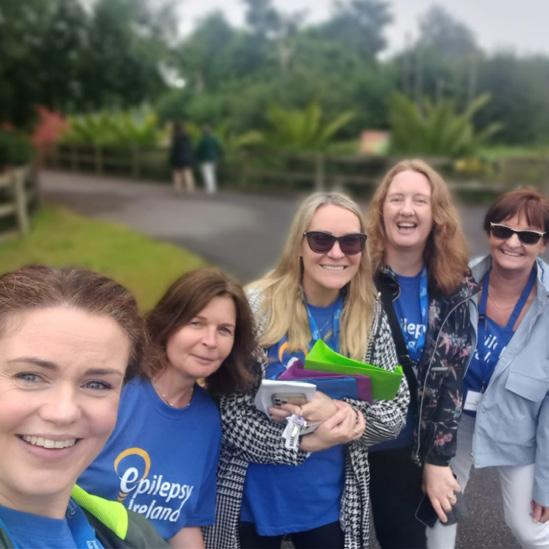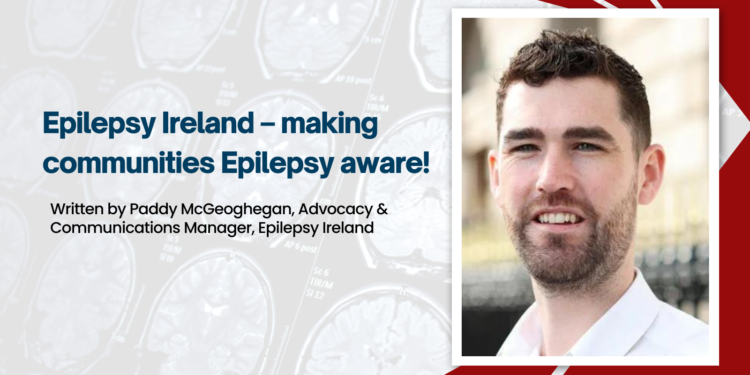May 20th – May 26th marked National Epilepsy Week, bringing one of the most common neurological conditions in the country into focus. With this important week for the epilepsy community having just taken place, we invited Epilepsy Ireland – via their Advocacy & Communications Manager, Paddy McGeoghegan – to share more information with Irish Pharmacy News about the work of the organisation….

Written by Paddy McGeoghegan, Advocacy & Communications Manager, Epilepsy Ireland
It a pleasure to be writing in this edition of Irish Pharmacy News to give community pharmacists insight about our work on the behalf of people with epilepsy and their families.
Epilepsy Ireland’s vision is to achieve a society where no person’s life is limited by epilepsy. Our Head Office is in Dublin, but like community pharmacists, we are also based in communities across Ireland – with 9 regional offices from Donegal to Cork. This strong community presence and work within communities is so important because epilepsy is a condition that affects people in all walks of life across Ireland. In fact, we estimate that over 45,000 people live with epilepsy in Ireland – making it one of the most common neurological conditions in the country.
Working towards our overall vision involves various strands of work. This includes our support and information services for people with epilepsy and their families; our training and education programmes for the wider community; our
awareness and advocacy campaigns; and finally, our investment in epilepsy research. Our support and information services are much depended upon by people with epilepsy and their families. This service is delivered by our local Community Resource Officers via our regional offices, and experiences circa 20,000 contacts every year. Epilepsy is a very individual journey for those living with it and the families that support them. Our services aim to support people along every step of that journey through one-toone work via the Living Well with Epilepsy ‘Toolkit’ programme, and groups events like our local/ national supports groups in addition to groups targeted at different age cohorts for e.g. Teen Time – an online group for teens to meet others living with epilepsy and discuss challenges they may be facing.
The best example of our Training and Education programmes can be seen via our Epilepsy Awareness and Administration of Buccal Midazolam (BM) training for professionals. I know many of you reading will be familiar with BM and its importance in reducing hospitalisation and reducing risk from prolonged seizures. Every year, we train circa 3,000 professionals in the administration of BM – with the vast majority of those being teachers/SNAs supporting a child with epilepsy in the classroom.
Some of the Epilepsy Ireland Community Resource Officer team

Awareness is so important when it comes to epilepsy. Unfortunately, as mentioned, there can still be stigma and misconceptions associated with the condition. The best way to combat this is by encouraging ongoing education and in particular, encouraging people with epilepsy to speak more openly about their condition to help the public separate the myths from the facts. During National Epilepsy Week, we provided a platform and shared several personal stories of the lived experience of epilepsy; these are the most powerful tools available to us when it comes to educating the public.
Achieving positive policy changes to improve the lives of people with epilepsy is also a key area of our work. As I write this, we have just assisted Minister Heather Humphreys with the launch of a new Free Travel scheme for those medically unfit to drive for at least a year and those who have never held a license due to a long-term health condition or disability. For many years, we advocated for this scheme and are delighted to see it officially launched – with an estimated 32,000 people set to potentially benefit. With elections on the horizon, we hope to
achieve many more positive policy changes for people with epilepsy in the future.
Research can mean many things to many people, but to our community, it represents hope. Learning more about a condition which still has many unknowns can help to change the outlook for people diagnosed with epilepsy in the future. We first began investing in research in 2009, and last year, we reached the milestone of having invested a total of ¤1.5 million in Irish epilepsy research across 23 different projects.
While this has been a brief overview, I hope I have provided you with some insight into the work we do. As community pharmacists, you will engage with people with epilepsy every day – so please do encourage the people with epilepsy you meet to reach out to us for information and support. Likewise, we are also there for local communities on all thing’s epilepsy-related so if you need information, please do not hesitate to contact us on info@epilepsy.ie or by calling 014557500.
For more information on epilepsy and Epilepsy Ireland, visit www.epilepsy.ie









